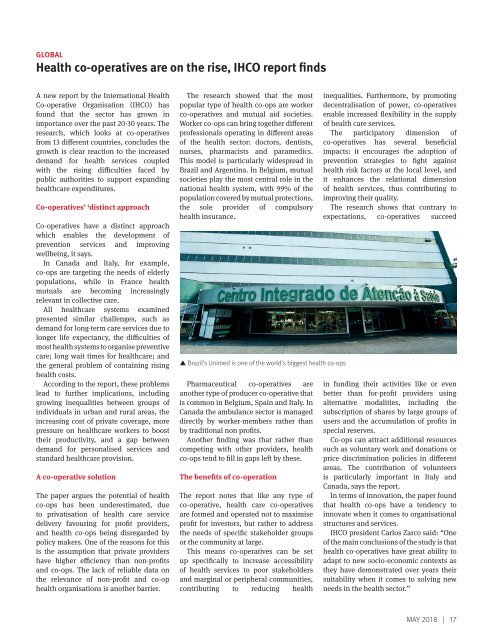MAY 2018
The May 2018 edition of Co-op News: connecting, challenging and championing the global co-operative movement. This issue shines a spotlight on governance – and how co-operatives do it differently. We also look at co-ops on the agenda in Westminster, sustainability supporting and preview some of the motions being put to the vote at the Co-op Group AGM.
The May 2018 edition of Co-op News: connecting, challenging and championing the global co-operative movement. This issue shines a spotlight on governance – and how co-operatives do it differently. We also look at co-ops on the agenda in Westminster, sustainability supporting and preview some of the motions being put to the vote at the Co-op Group AGM.
You also want an ePaper? Increase the reach of your titles
YUMPU automatically turns print PDFs into web optimized ePapers that Google loves.
GLOBAL<br />
Health co-operatives are on the rise, IHCO report finds<br />
A new report by the International Health<br />
Co-operative Organisation (IHCO) has<br />
found that the sector has grown in<br />
importance over the past 20-30 years. The<br />
research, which looks at co-operatives<br />
from 13 different countries, concludes the<br />
growth is clear reaction to the increased<br />
demand for health services coupled<br />
with the rising difficulties faced by<br />
public authorities to support expanding<br />
healthcare expenditures.<br />
Co-operatives’ ‘distinct approach<br />
Co-operatives have a distinct approach<br />
which enables the development of<br />
prevention services and improving<br />
wellbeing, it says.<br />
In Canada and Italy, for example,<br />
co-ops are targeting the needs of elderly<br />
populations, while in France health<br />
mutuals are becoming increasingly<br />
relevant in collective care.<br />
All healthcare systems examined<br />
presented similar challenges, such as<br />
demand for long-term care services due to<br />
longer life expectancy, the difficulties of<br />
most health systems to organise preventive<br />
care; long wait times for healthcare; and<br />
the general problem of containing rising<br />
health costs.<br />
According to the report, these problems<br />
lead to further implications, including<br />
growing inequalities between groups of<br />
individuals in urban and rural areas, the<br />
increasing cost of private coverage, more<br />
pressure on healthcare workers to boost<br />
their productivity, and a gap between<br />
demand for personalised services and<br />
standard healthcare provision.<br />
A co-operative solution<br />
The paper argues the potential of health<br />
co-ops has been underestimated, due<br />
to privatisation of health care service<br />
delivery favouring for profit providers,<br />
and health co-ops being disregarded by<br />
policy makers. One of the reasons for this<br />
is the assumption that private providers<br />
have higher efficiency than non-profits<br />
and co-ops. The lack of reliable data on<br />
the relevance of non-profit and co-op<br />
health organisations is another barrier.<br />
The research showed that the most<br />
popular type of health co-ops are worker<br />
co-operatives and mutual aid societies.<br />
Worker co-ops can bring together different<br />
professionals operating in different areas<br />
of the health sector: doctors, dentists,<br />
nurses, pharmacists and paramedics.<br />
This model is particularly widespread in<br />
Brazil and Argentina. In Belgium, mutual<br />
societies play the most central role in the<br />
national health system, with 99% of the<br />
population covered by mutual protections,<br />
the sole provider of compulsory<br />
health insurance.<br />
p Brazil’s Unimed is one of the world’s biggest health co-ops<br />
Pharmaceutical co-operatives are<br />
another type of producer co-operative that<br />
is common in Belgium, Spain and Italy. In<br />
Canada the ambulance sector is managed<br />
directly by worker-members rather than<br />
by traditional non profits.<br />
Another finding was that rather than<br />
competing with other providers, health<br />
co-ops tend to fill in gaps left by these.<br />
The benefits of co-operation<br />
The report notes that like any type of<br />
co-operative, health care co-operatives<br />
are formed and operated not to maximise<br />
profit for investors, but rather to address<br />
the needs of specific stakeholder groups<br />
or the community at large.<br />
This means co-operatives can be set<br />
up specifically to increase accessibility<br />
of health services to poor stakeholders<br />
and marginal or peripheral communities,<br />
contributing to reducing health<br />
inequalities. Furthermore, by promoting<br />
decentralisation of power, co-operatives<br />
enable increased flexibility in the supply<br />
of health care services.<br />
The participatory dimension of<br />
co-operatives has several beneficial<br />
impacts: it encourages the adoption of<br />
prevention strategies to fight against<br />
health risk factors at the local level, and<br />
it enhances the relational dimension<br />
of health services, thus contributing to<br />
improving their quality.<br />
The research shows that contrary to<br />
expectations, co-operatives succeed<br />
in funding their activities like or even<br />
better than for-profit providers using<br />
alternative modalities, including the<br />
subscription of shares by large groups of<br />
users and the accumulation of profits in<br />
special reserves.<br />
Co-ops can attract additional resources<br />
such as voluntary work and donations or<br />
price discrimination policies in different<br />
areas. The contribution of volunteers<br />
is particularly important in Italy and<br />
Canada, says the report.<br />
In terms of innovation, the paper found<br />
that health co-ops have a tendency to<br />
innovate when it comes to organisational<br />
structures and services.<br />
IHCO president Carlos Zarco said: “One<br />
of the main conclusions of the study is that<br />
health co-operatives have great ability to<br />
adapt to new socio-economic contexts as<br />
they have demonstrated over years their<br />
suitability when it comes to solving new<br />
needs in the health sector.”<br />
<strong>MAY</strong> <strong>2018</strong> | 17


















